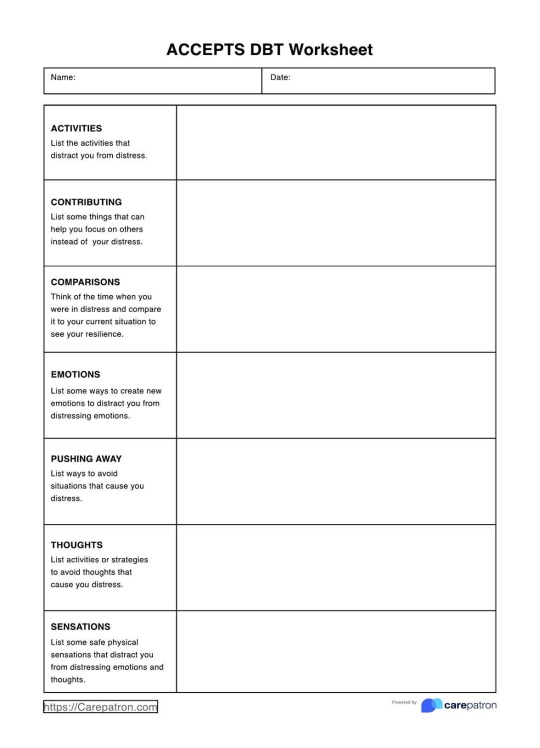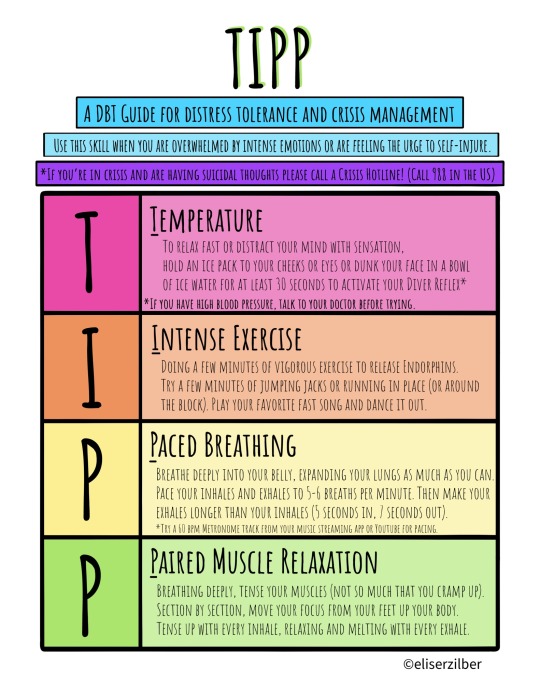#DBT
Explore tagged Tumblr posts
Text

The Dialectical Behavior Therapy Skills Workbook
909 notes
·
View notes
Text
it’s okay to be bad at things you enjoy.
it’s okay to draw even if it doesn’t look how you imagined. it’s okay to paint even if it ends up messy. it’s okay if you can’t memorize formulas or do mental math. it’s okay if you can’t describe a scene perfectly with words; or if you can never get your tone just right on stage.
You can do things just to do them and because you enjoy them. You don’t need to be the best ar something to love it. You enjoying it is enough reason to keep doing it. It’s okay
2K notes
·
View notes
Text
It's ok to grieve the life you wanted but can no longer have, or to grieve the life you used to have. The grief may pass, or it may always be there. Accepting (dare I say "radically accepting") that you can both grieve what you can't have *and* appreciate what you do have is something I think is vital to minimizing the pull towards believing death is a better outcome.
#mental illness#acceptance#radical acceptance#dbt#mental health#schizospec#schizoaffective#schizophrenia#actuallybipolar#recovery#221bluescarf.txt
142 notes
·
View notes
Text
Man I wish more people here did DBT if only so I could post marsha linehan memes. That woman saved my life but boy does she love catholicism and ghastly metafors and describing things as being on fire and being flayed alive. Reading her biography and realising she wanted to be a martyr first and radically influence the field of psychology second explained a lot.
#She's crazy I love her#You can't invent a treatment for your own disorder and be normal about it#dbt#marsha linehan
65 notes
·
View notes
Text
Learning about Dialectical Behaviour Therapy, very cool and interesting stuff 😎
3 notes
·
View notes
Text

[ID: Series of greyscale rough sketches of Tails from Sonic the Hedgehog with different expressions. Above each is the name of the emotion shown, which are (left to right and top to bottom) - envy, jealousy, disgust, anger, fear, love, guilt, shame, sadness, happineess. End ID]
-
DBT homework to learn about the ten core emotions, so, although I have a very hefty number of arting and writing things that I need to do, decided to help my brain remember with some random doodles of a beloved character, Tails. Can colour in individual ones that I feel capable of coping with/regulating (an excellent excuse to use homework time as also art time)
#sonic the hedgehog#sth#tails the fox#miles tails prower#tails#dbt#dbt skills#random art#sketchy random stuff#fictional characters help the brain make sense of stuff
143 notes
·
View notes
Text
People who have recovered from BPD or who have passed the recovery crest; what was the Thing that Clicked for you?
For me? It was the phrase: "You can't force anyone to want anything."
It wasn't particularly profound, and it wasn't said in any particular way, but it was a phrase that embedded itself into my mind from that moment. Maybe it's my penchant for nihilism, but something so negative ended up being so strangely comforting. To realize one thing is impossible is to realize you no longer have to fight for it.
Imagine straining yourself to move a boulder only to learn that it's embedded into the earth. Do you keep pushing with the knowledge you'll never succeed, or do you finally rest?
You can't force anyone to want something.
If you jackhammer the rock, it's no longer the same rock. So what's the point in trying to force it? You can beg someone to want you, but that only leads to feelings of guilt or obligation. You can manipulate someone into agreeing with you, but that only leads to feelings of fear and resentment.
You can't control people's desires. People can't even control their own desires! So of course, that makes sense!
It wasn't until I radically accepted that fact that I finally started searching for things that were WITHIN my control.
What was within my control? My reactions. It was tough as hell to learn how to shut my mouth, but once it clicked that the only person in control of that mouth was ME?... that's when I accepted the challenge.
Like okay, Jordan, you want control? Then take control and make yourself think these thoughts silently without spewing them. Take control and let that person walk away in peace. Take control and let yourself be misunderstood just once. Take control and write in your journal. Try that on for size.
And I DID. And it WORKED. And it's still fucking hard to do, and I still fail at it sometimes, but I get SO much satisfaction when I succeed in measuring my emotional responses now because I did that. I controlled that. That was my power. I'm so powerful, I am the boulder and I am moving. I can't control how other people feel about me. But I can control what I do in response.
And that hard work might not give me what I initially wanted -- it might not result in me getting ANYTHING I want -- but I feel so proud every time I make the conscious effort to let people have their peace. Every time I succeed, I feel like a better version of myself, like I've leveled up. I enjoy that sense of control, and that's enough for me.
#this is a very self-centered view on recovery and i think that's perfectly fine tbh#i think it would be unrealistic to expect BPD sufferers to inherently know how to set their own feelings aside#empathy and compassion can be present but overshadowed by paranoia and visceral fear and anger and sadness#you can't just empathize your way out of emotions so physically painful#bpd#borderline personality disorder#actually bpd#bpd recovery#dbt#dialectical behavior therapy#radical acceptance#mental health#mental illness#yapping
3 notes
·
View notes
Text

124 notes
·
View notes
Text
But fr I think she would be, I’ve got soooooo much self control, thorough mindful thinking, and emotion regulation🤗

1K notes
·
View notes
Text
DBT taught me something so crazy this week. As always I've been struggling with my sobriety and battling strong urges. Yesterday in group therapy we talked about mindfully observing thoughts. We practiced imagery of a thought coming in through one door in a room and going straight out the other. We can watch our thoughts that way. We also talked about how we are not our thoughts. As I've learned through many failed attempts at meditation, thoughts are just random impulses that appear regardless of whether or not you call them. I thought "you are not your thoughts" was a little obvious, but I tried it today with my substance abuse urges. When I'd think about getting high I'd imagine a white room and that thought coming in one door and going out another. I'm the person sitting in the room. The thought came and went and I saw it, but I was still in the room. Sometimes passing thoughts trick us into thinking they are our own voices. A healthier way to interact with our minds is to remember we are the person in the room watching thoughts appear and disappear.
196 notes
·
View notes
Text

155 notes
·
View notes
Text




preventative action for meltdowns today… let’s do this
1 note
·
View note
Text





Self-Soothing
#art#artists on tumblr#mentalhealth#comics#mental health#actually mentally ill#childhood trauma#complex ptsd#mentally unwell#trauma#dbt#dbt therapy#dbt skills#emotional regulation#mental health recovery#coping#mental heath awareness#mental illness
181 notes
·
View notes
Text

TIPP
Use this skill when you are overwhelmed by intense emotions or are feeling the urge to self-injure.
*If you’re in crisis and are having suicidal thoughts please call a Crisis Hotline! (Call 988 in the US)
T - Temperature: To relax fast or distract your mind with sensation, hold an ice pack to your cheeks or eyes or dunk your face in a bowl of ice water for at least 30 seconds to activate your Diver Reflex*.
*If you have high blood pressure, talk to your doctor before trying.
I - Intense Exercise: Doing a few minutes of vigorous exercise will release Endorphins. Try a few minutes of Jumping Jacks or running in place (or around the block). Play your favorite fast paced song and dance it out.
P - Paced Breathing: Breathe deeply into your belly, expanding your lungs as much as you can. Pace your inhales and exhales to 5-6 per minute. Then make your exhales longer than your inhales (5 seconds in, 7 seconds out).
*Try a 60 bpm Metronome track from your music streaming app or YouTube for pacing.
P - Paired Muscle Relaxation: Breathing deeply, tense your muscles (not so much that you cramp up) section by section, move your focus from your feet up your body. Tense up with every inhale, relaxing and melting with every exhale.
*More DBT guides here*
#dbt#dbt guide#dbt skill#dbt skills#dialectical behavior therapy#therapy#resource#resources#bpd thoughts#actually bpd#bpd#borderline pd#borderline personality#bpd life#bpd problems#bpd shit#bpd stuff#crisis plan#crisis management#distress#tolerance#distress tolerance#TIPP#tipp skill
219 notes
·
View notes
Text
DEAR MAN: Making Yourself Heard
This interpersonal effectiveness skill helps you assert your boundaries, and get yourself heard and understood.
D: Describe
Describe the current situation (if necessary). Stick to the facts. Tell the person exactly what you are reacting to.
Example: “You told me you would be home by dinner but you didn’t get here until 11.”
E: Express
Express your feelings and opinions about the situation. Don’t assume that the other person knows how you feel.
Use phrases such as “I want” instead of “You should,” “I don’t want” instead of “You shouldn’t.”
Example: “When you come home so late, I start worrying about you.”
A: Assert
Assert yourself by asking for what you want or saying no clearly. Do not assume that others will figure out what you want. Remember that others cannot read your mind.
Example: “I would really like it if you would call me when you are going to be late.”
R: Reinforce
Reinforce (reward) the person ahead of time (so to speak) by explaining positive effects of getting what you want or need. If necessary, also clarify the negative consequences of not getting what you want or need. Remember also to reward desired behavior after the fact.
Example: “I would be so relieved, and a lot easier to live with, if you do that.”
M: stay Mindful
Keep your focus on your goals. Maintain your position. Don’t be distracted. Don’t get off the topic.
“Broken record”: Keep asking, saying no, or expressing your opinion over and over and over. Just keep replaying the same thing again and again.
Ignore attacks: If another person attacks, threatens, or tries to change the subject, ignore the threats, comments, or attempts to divert you. Do not respond to attacks. Ignore distractions. Just keep making your point.
Example: “I would still like a call.”
A: Appear confident
Appear effective and competent. Use a confident voice tone and physical manner; make good eye contact. No stammering, whispering, staring at the floor, retreating. No saying, “I’m not sure,” etc.
N: Negotiate
Be willing to give to get. Offer and ask for other solutions to the problem. Reduce your request. Say no, but offer to do something else or to solve the problem another way. Focus on what will work.
Turn the tables: Turn the problem over to the other person. Ask for other solutions.
Example: “How about if you text me when you think you might be late?” “What do you think we should do? . . . I can’t just stop worrying about you [or I’m not willing to].”
More tips
Describe the current interaction.
If the “broken record” and ignoring don’t work, make a statement about what is happening between you and the person now, but without imputing motives.
Example: “You keep asking me over and over, even though I have already said no several times,” or “It is hard to keep asking you to empty the dishwasher when it is your month to do it.”
Not: “You obviously don’t want to hear what I am saying,” “You obviously don’t care about me,” “Well, it’s obvious that what I have to say doesn’t matter to you,” “Obviously you think I’m stupid.”
Express feelings or opinions about the interaction.
For instance, in the middle of an interaction that is not going well, you can express your feelings of discomfort in the situation.
Example: “I am sorry I cannot do what you want, but I’m finding it hard to keep discussing it,” or “It’s becoming very uncomfortable for me to keep talking about this, since I can’t help it. I am starting to feel angry about it,” or “I’m not sure you think this is important for you to do.”
Not: “I hate you!”, “Every time we talk about this, you get defensive,” “Stop patronizing me!”
Assert wishes in the situation.
When another person is pestering you, you can ask them to stop it. When a person is refusing a request, you can suggest that you put the conversation off until another time. Give the other person a chance to think about it.
Example: “Please don’t ask me again. My answer won’t change,” or “OK, let’s stop discussing this now and pick it up again sometime tomorrow,” or “Let’s cool down for a while and then get together to figure out a solution.”
Not: “Would you shut up?” “You should do this!”, “You should really calm down and do what’s right here.”
Reinforce.
When you are saying no to someone who keeps asking, or when someone won’t take your opinion seriously, suggest ending the conversation, since you aren’t going to change your mind anyway. When trying to get someone to do something for you, you can suggest that you will come up with a better offer later.
Example: “Let’s stop talking about this now. I’m not going to change my mind, and I think this is just going to get frustrating for both of us,” or “OK, I can see you don’t want to do this, so let’s see if we can come up with something that will make you more willing to do it.”
Not: “If you don’t do this for me, I’ll never do anything for you ever again,” “If you keep asking me, I’ll get a restraining order against you,” “Gosh, you must be a terrible person for not doing this / for asking me to do this.”
- from DBT Skills Training Handouts and Worksheets (2015) by Marsha M. Linehan, pp. 125-7.
#dbt#dbt skills training#dear man#dearman#interpersonal relationships#interpersonal effectiveness#conflict resolution#assertiveness#boundaries#boundary setting#assertion
149 notes
·
View notes